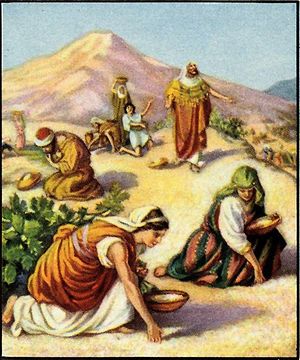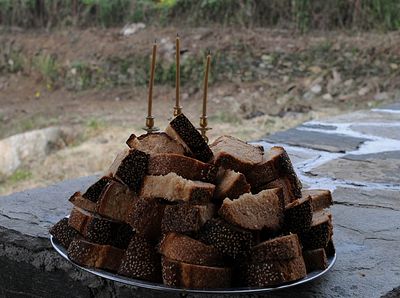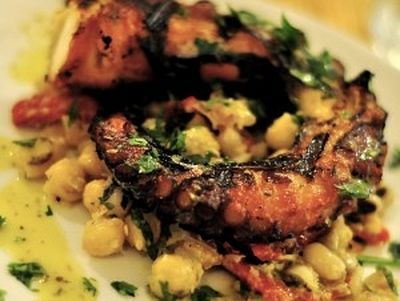 Israelites gathering manna in the wilderness.
Israelites gathering manna in the wilderness.
Our situation has contrasts and similarities with the ancient Israelites led by Moses out of slavery under the Egyptians into the desert wilderness of Sinai (Exodus 16). They are hungry and begin to complain to Moses saying they would have rather died with full bellies in Egypt rather than be hungry and free in the wilderness (vv.2-3). They were ungrateful for their freedom and lacked faith. However, God of course already had a plan to feed His people. That evening quails came and covered the camp and in the morning the manna lay all around (v.13). Manna was the fine, small round substance (v.14) that was like white coriander seed that tasted like wafers made with honey (v.31). Moses stated that it was the bread the Lord has given (v.15).
While providing food for the Israelites, God laid down three commandments for consuming the manna. First, every man was to gather according to the need of his family (vv.4,16). Second, he was to gather every morning (vv.4,21). And third, he was to gather twice as much on Friday in order to rest, meaning not gather, on the holy Sabbath to the Lord (vv.5,22-23). Why did God give these commandments? He says, “That I may test them, whether they will walk in My law or not” (v.4). Let us not forget that God provided the manna in the first place so that Israelites “shall know that the Lord has brought you out of the land of Egypt…and see the glory of the Lord” (vv.6-7). These commandments the Lord also gave to teach the Israelites holiness by three principles: 1) temperance to guard against gluttony, 2) regular habits of work to avoid slothfulness, and 3) purposeful rest in order to worship God.
Now as God sought to test His people, some were testing Him by trying to hoard more than their need of manna. Some were lazily gathering less and others were going out on the Sabbath to gather. God was prepared to also teach these prideful people. For “he who gathered much had nothing left over, and he who gathered little had no lack” (v.18). The Israelites were supposed to consume the manna daily but those who tried to hoard it in their home found it spoiled the next day (v.20). “Some of the people went out on the seventh day to gather, but they found none” (v.27). Apparently, it took them a long time to learn because the children of Israel ate manna forty years in the wilderness (v.35).
The great multitude and the disciples who followed Jesus in today’s gospel, the 8th Sunday of Matthew 14:14-22, certainly knew the story of the Israelites and the Manna in the wilderness. So when Christ takes the five loaves and two fish and feeds 5000 men, not counting women and children (vv.17,21) the people must have begun to understand that He was indeed the Son of God, the same God who fed the Israelites hundreds of years before.
We also can learn from these two accounts. Sunday mornings are a good example. The Church has prescribed for us to not work on the Lord’s Day and to fast from food and sin in preparation to receive the new Manna, the new bread from heaven, and that is the Body and Blood of our Lord Jesus Christ. We must ask ourselves, “Have we made ourselves physically hungry through fasting in order to focus on our spiritual hunger for God?”
The way Jesus multiplies the loaves and fishes provides us with a good example for our daily meals. Do we look up into heaven understanding that the food before us and everything we have is ultimately from God? (Mt.14:19). Do we bless and consecrate our food, our home, ourselves, and our family so that all of it may become a sacrifice and a sacrament unto God? Do we break and share our food and possessions with others, especially those in need?
These holy habits of mind and body serve to till the ground of our heart and soul. We live in a society and a world that is spiritually desolate. We are constantly influenced by this environment that lacks connection with God. Our complaints in life may often be focused towards what we think is wrong in the world and people around us and surely there is a lot wrong when we look for it. However, fixing the people and the world around us is impossible. Letting God fix us is possible.
Therefore, we must be thankful for the material food and possessions God has blessed us with. In addition, we must look towards Christ for spiritual fulfillment when we are bored, when we are in pain, when we are persecuted and when we feel alienated. His manna is found in prayer, in His Word, in spiritual counsel and confession, in reconciliation, in feeding other people and in many other holy habits the Church teaches. If we are all seeking to be fed and filled in the manner, then as St. Paul says in today’s epistle reading, there will be no divisions among us and we will be perfectly joined together in the same mind (1Corinthians 1:10). Amen!
* * *
Fr. Richard Demetrius Andrews is the pastor of St. George Greek Orthodox Church in St. Paul, Minnesota. Fr. Andrews is the past president of Minnesota Eastern Orthodox Christian Clergy Association (MEOCCA), and a volunteer chaplain with the St. Paul Police Department.





